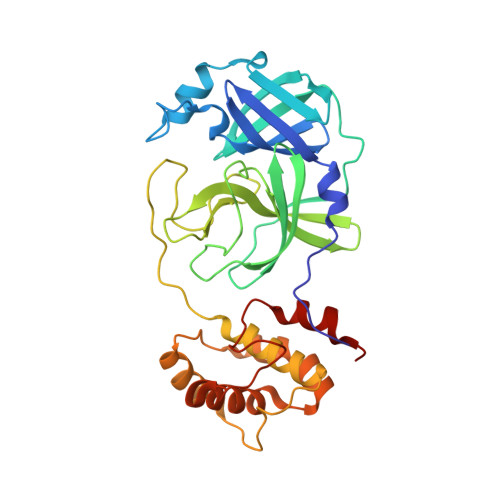3CL Protease Inhibitors with an Electrophilic Arylketone Moiety as Anti-SARS-CoV-2 Agents.
Konno, S., Kobayashi, K., Senda, M., Funai, Y., Seki, Y., Tamai, I., Schakel, L., Sakata, K., Pillaiyar, T., Taguchi, A., Taniguchi, A., Gutschow, M., Muller, C.E., Takeuchi, K., Hirohama, M., Kawaguchi, A., Kojima, M., Senda, T., Shirasaka, Y., Kamitani, W., Hayashi, Y.(2022) J Med Chem 65: 2926-2939
- PubMed: 34313428
- DOI: https://doi.org/10.1021/acs.jmedchem.1c00665
- Primary Citation of Related Structures:
7E18, 7E19 - PubMed Abstract:
The novel coronavirus, SARS-CoV-2, has been identified as the causative agent for the current coronavirus disease (COVID-19) pandemic. 3CL protease (3CL pro ) plays a pivotal role in the processing of viral polyproteins. We report peptidomimetic compounds with a unique benzothiazolyl ketone as a warhead group, which display potent activity against SARS-CoV-2 3CL pro . The most potent inhibitor YH-53 can strongly block the SARS-CoV-2 replication. X-ray structural analysis revealed that YH-53 establishes multiple hydrogen bond interactions with backbone amino acids and a covalent bond with the active site of 3CL pro . Further results from computational and experimental studies, including an in vitro absorption, distribution, metabolism, and excretion profile, in vivo pharmacokinetics, and metabolic analysis of YH-53 suggest that it has a high potential as a lead candidate to compete with COVID-19.
- School of Pharmacy, Department of Medicinal Chemistry, Tokyo University of Pharmacy and Life Sciences, Hachioji, Tokyo, 192-0392, Japan.
Organizational Affiliation:


















